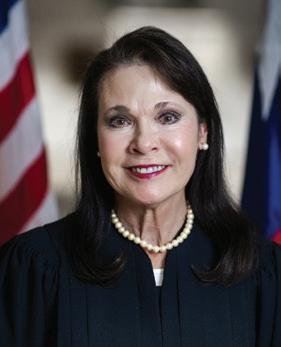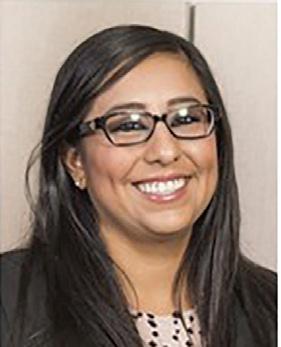
6 minute read
The Texas Business Court, Part III
Learning the Texas Business Court Rules
By the Hon. Marialyn Barnard and Andrea Morris
In addition to what kinds of suits the Texas Business Court hears (which was covered in this publication’s last installment), we are often asked what rules of practice govern the court. Like the Texas District Courts, the Business Court follows the Texas Rules of Civil Procedure. Specifically, Rules 354 to 359 of the Texas Rules of Civil Procedure govern practicing before the Business Court. These rules cover a variety of topics, such as the court’s authority and venue; removal, remand, and transfer procedures; appearing remotely before the court; and the court’s authority to issue written opinions.
Like U.S. District Court? Not exactly. Like Texas District Court? Sort of.
It is particularly worth noting that several of the rules governing the Business Court resemble federal practice. As highlighted in the last installment, the removal and remand procedures share many similarities with those of the federal court. See Tex. R. Civ. P. 355. Additionally, like a U.S. District Court, the Business Court issues written opinions for certain rulings, such as dispositive rulings upon a party’s request or other rulings important to the jurisprudence of the state. See id. R. 360. In fact, many of the court’s initial opinions largely concerned whether the court could hear cases that had commenced before September 1, 2024. Each division analyzed the plain language of House Bill 19 and concluded that the court did not have authority to hear such cases. On February 21, 2025, the Fifteenth Court of Appeals agreed, holding that civil actions filed before September 1, 2024, in state District Court could not be removed to the Business Court after that date. See In re ETC Field Servs., LLC, No. 15-24-00131-CV, 2025 WL 582320 (Tex. App.—15th Dist., Feb. 21, 2025, orig. proceeding).
In its first 100 days, the Business Court adopted local rules. These rules apply uniformly to all the divisions and can be found on the court’s website at https://www.txcourts.gov/about-texas-courts/business-court/. See BCLR 1. The rules set out that the court is “dedicated to the fair, efficient, and timely resolution of business disputes,” and thus is focused on streamlining the resolution of disputes. See id. Parties are encouraged to familiarize themselves with the court’s website and rules, which include detailed requirements for motion practice; proposed scheduling orders and corporate disclosure obligations; word limits and formatting requirements for motions; and prerequisites to requesting emergency relief.

You have to learn the rules of the game. And then you have to play better than anyone else.
— ALBERT EINSTEIN
Highlighting Key Differences Between Texas District Court and the Business Court
Below are some of the rules litigants may find informative. These highlights touch on some of the significant differences between practicing in state District Court and the Business Court. In fact, federal practitioners may find themselves familiar with several of these rules.
• BCLR 2: Assignment, Severance, and Consolidation: Parties should be aware that the Business Court judges may exchange benches, allowing them to sit and act for each other in any matter pending before the court. This means that much like a visiting judge, a Business Court judge from one division may sit on a case for another judge in another division. In such cases, the re-assigned judge makes every effort to hear matters either remotely or in person in the designated division without requiring the parties to travel beyond their original division.
• BCLR 3: Case Information Sheet: Much like many state District Courts, the Business Court requires a party to file a Business Court Information Sheet concurrently with any filing that initiates a new case. A case information sheet form can be found on the court’s website.
• BCLR 4: Case Management and Discovery: Similar to federal practice, every case is governed by a scheduling order. The court requires parties to confer and jointly file a proposed scheduling order within a specified amount of time, depending on how the case was initiated in the court. The court also requires each party to file a corporate-disclosure statement with the proposed scheduling order. Finally, this rule outlines a prerequisite to filing discovery motions, which requires a party to file a letter summarizing the nature of a discovery dispute with an explanation of the attempts made to resolve or narrow the dispute before filing a discovery motion. Such letters and responses must not exceed 700 words.
• BCLR 5: Motions: This rule outlines the specific word limits the court has for different types of motions. The main document along with any appendices should be filed in as few separate PDFs as possible, and all motions should be accompanied by a proposed order as well as a certificate of conference.
• BCLR 7: Emergency Relief: Parties seeking emergency relief should notify the Business Court Clerk as soon as possible. The Clerk’s contact information can be found on the court’s website. The court also asks applicants to file, within a specified timeframe, a certificate stating either the grounds supporting a request for ex parte relief or setting forth the date, time, and manner of notice to opposing parties.

Know how to win by following the rules.
— ARNOLD PALMER
The Fourth Division does not have additional rules of practice. However, litigants should be aware that some of the divisions have additional preferences and guidelines governing their division. A copy of each division’s procedures can be found on the court’s website. Litigants should also be aware that the court’s opinions can be found on the court’s website, and copies of orders can be found on re:SearchTX.
Although procedural rules can be seen as tedious, the goal of the Business Court is to provide an attractive court for business litigants to efficiently resolve their business disputes. As such, the court’s rules of practice aim to streamline the litigation process, and the court encourages business litigants to make use of this specialized court.



